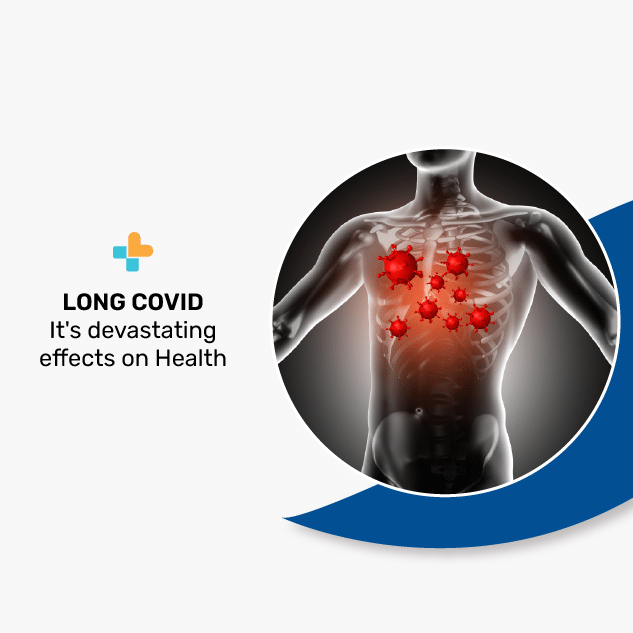COVID-19, or Coronavirus disease, is an illness that shook the entire humankind. The turmoil created by this virus is massive and impacted millions of lives across the globe. COVID-19 is a pulmonary disease caused by severe acute respiratory syndrome coronavirus 2 (SARS-CoV-2). The effect of the virus is enormous, especially in the healthcare sector, where saving lives remains the most significant challenge and need of the hour. Basic safety measures like wearing a proper surgical mask, maintaining social distancing, and time-to-time hand sanitization are the key to avoiding the risk of infection.
Despite following specific precautionary measures, the spread of infection seems uncontrollable. The symptoms of COVID-19 usually ease within a few weeks of getting affected by the virus. However, it is seen that a few patients who recovered from COVID-19 are experiencing its effects even after months of recovery. In this article, let us understand about ‘long Covid’ and its impact on the human body.
What is Long Covid?
Long Covid is a term that is used to describe the long-term symptoms of COVID-19 in patients who have been affected with Coronavirus. Most of the investigations say that the viruses predominantly affect the lungs apart from the most common symptoms like cough, cold, fever, and body aches. Although these symptoms ease with prescribed medications, the impact of the virus on the human body doesn’t go away quickly.
COVID-19 in Children
Although the impact of COVID-19 in children is comparatively lesser than in adults, it impacts both mental and physical health in the paediatric population. As per the research, children have fewer symptoms of the virus, unlike in the elderly population. But one should be watchful before the symptoms become severe in children.
Some of the common symptoms to be watchful in children are:
- High-grade fever
- Convulsions
- Loose motions
- Abdominal pain or tenderness
- Bluish discolouration of lips, palms or feet
- Difficulty/fast breathing
Dr. Dhivya Shree, a paediatrician atAyu Health, says that children face an impact on their mental health for being barred from regular schooling, physical activities, and spending quality time with their friends. Less communication and being all alone most of the time is making children psychologically ill. This is mostly seen among the school-going children between 5 to 15 years and the adolescent group. Reduced physical activity in children increases the risk for childhood obesity since the time COVID-19 hit the world.
Another doctor atAyu Health, Dr Vikram Bedi, paediatrician, and neonatologist tells us that there aren’t any long-term side effects of COVID-19 which are seen in children. A few of the side effects noticed after Covid are a little bit of malaise, lethargy, and weakness. All of these can be reduced by plenty of nutritious foods and adequate fluid intake. As of now, according to the data, there are not many long-term complications of Covid-19 in children.
Effect COVID-19 on heart health
Heart problems were seen among the patients who suffered from COVID-19 during the first wave. During the 2nd wave, lungs were the most affected organs where most people had low oxygen saturation levels. Dr. S.S. Ramesh, a senior cardiologist atAyu Health, says that myocardial infarction, heart attack, blood clots in the aorta were commonly seen heart problems in patients during the first wave of COVID-19 in India.
So far, there aren’t any long-term effects of the virus reported on heart health. However, a certain impact might be seen in the patients who had a heart attack or damage to the heart muscle. It is essential to have a check on oxygen saturation and heart rate. One should seek immediate medical help if the heart rate persistently exceeds 100.
Dr. Devendra Singh Bisht, a cardiologist atAyu Health, tells us that a broad spectrum of cardiac manifestations is reported in patients with COVID-19. Some of which are asymptomatic cardiac abnormalities that show up on an ECG, MRI or echo tests, myocardial injury (injury to the heart muscle), stress cardiomyopathy (weakening of the heart muscle), and cardiogenic shock (extremely lower blood pressure).
COVID-19 – Its impact on psychological health
Along with physical health, Coronavirus disease has led to many psychiatric conditions. Panic symptoms like fear, anxiety disorders, increased heartbeat, fearfulness, fear of death, shortness of breath (breathing difficulties), and obsessive-compulsive disorders (OCD) are most commonly seen in people. Some people think that COVID-19 isn’t but death. This fear makes them develop depression and anxiety disorders. The mortality rate of COVID-19 is relatively less when compared to the deaths resulting from major illnesses like heart attack, stroke, cancers, and severe medical problems.
COVID-19 led to suicides in some cases, primarily due to continuous lockdowns, job loss, loved ones, etc. Work from home increased marital issues, especially among the women who have tremendous pressure in maintaining a work-life balance. One of the major causes of psychological stress is the overhype created by print and electronic media, especially while highlighting the increase in the Covid positive cases and throwing some less light on the recovery.
It is crucial to address the panic symptoms at the earliest to avoid further health issues. We must closely observe and provide immediate medical help to the patient suffering from fearfulness, breathing difficulties, shivering of hands, sweating, or light-headedness/dizziness.
Impact of Covid on neurological health
It is important for healthcare professionals and the general public to understand the neurological symptoms presented in the case of COVID-19. Timely diagnosis and treatment can reduce the risk of further complications. Neurological symptoms, such as persistent headaches, drowsiness, altered mental status, slurred speech, weakness of limbs, acute muscular pain, should be immediately evaluated by a neurologist. Tests like CT and MRI scans, CSF analysis, and nerve conduction studies can help diagnose these conditions. In common headaches, numbness/tingling sensation, brain fog, anosmia (reduced/absent smell perception), dysgeusia (reduced/altered taste perception), and myalgias are the most common neurological manifestations observed in a patient with COVID-19.
Dr Anil Sofat, a neurosurgeon at Ayu Health tells us that neurological symptoms in patients with COVID-19 can happen due to many reasons. He mentions some of them as a hyper-immune response, invasion of the virus into the cerebrospinal fluid (CSF), production of auto-antibodies against nerve cells of the central or peripheral nervous system. Also, coagulation abnormalities due to the immune response, hypoxia in COVID causing decreased oxygen supply to the brain, and damage to the blood-brain barrier due to hyperimmune reaction were the neurological symptoms noticed in patients with Covid disease.
Hair loss – A worrisome post-covid affect
Hair loss is one of those commonly reported post-covid effects in people. This is because of the extreme shock and autoimmune responses that the body undergoes when suffering from Covid infection. Dr Gaurav Tiwari, a dento-facial aesthetic specialist at Ayu Health, mentions that our regular hair cycle gets disturbed when our body is recovering from an illness. Our body initially tries to repair the major organs, such as the heart, kidneys, lungs, and liver. During this time, our hair goes into a long resting period called the telogen phase. This automatically results in a shorter growth phase or anagen phase. Simultaneously under such conditions, the catagen phase or the shedding phase accelerates and thus, people experience increased hair fall. Hair loss is usually reversed once the disease or illness subsides.
In people who recovered from Covid, we commonly witness a problem called alopecia areata, an autoimmune disease. Here, the body reacts to its own hairs and reduces the hair size by assuming it to be a foreign body. We notice patchy hair loss in such cases, which is reversible with steroidal treatment.
In conclusion, we understand that the impact of COVID-19 is not just when you are suffering from the infection. Most of the organs in the body witness specific changes that result in long-term symptoms. However, extensive research is still happening to understand the long-term effects of Covid on the human body.
If you need additional resources or would like to speak with a professional, feel free to contact us right away at +91 636-610-0800 or book an appointment on our website. Our expert team is here to assist and support you every step of the way.
Also read : COVID-19 / Coronavirus: All you need to know
Our Hospital Locations
General Surgery Hospitals in Chandigarh | General Surgery Hospitals in Bangalore | General Surgery Hospitals in Jaipur | General Surgery Hospitals in NCR | General Surgery Hospitals in Hyderabad
Our Doctors
General Surgery Doctors in Chandigarh | General Surgery Doctors in Bangalore | General Surgery Doctors in Jaipur | General Surgery Doctors in NCR | General Surgery Doctors in Hyderabad
About the Author

Dr. S. Goel
Dr. S. Goel is a renowned Internal Medicine Specialist currently practicing at Ayu Health, Bangalore. He is a Specialist in Internal Medicine, Diabetes HTN, Paediatric Care, and Family Medicine.




